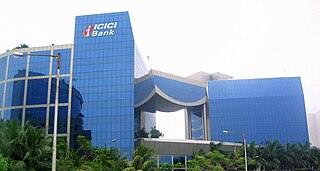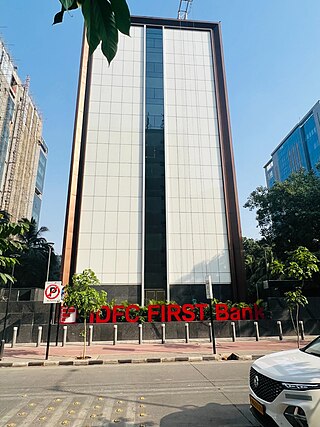
HSBC Holdings plc is a British universal bank and financial services group headquartered in London, England, with historical and business links to East Asia and a multinational footprint. It is the largest Europe-based bank by total assets, ahead of BNP Paribas, with US$2.919 trillion as of December 2023. In 2021, HSBC had $10.8 trillion in assets under custody (AUC) and $4.9 trillion in assets under administration (AUA).

State Bank of India (SBI) is an Indian multinational public sector bank and financial services statutory body headquartered in Mumbai, Maharashtra. SBI is the 47th largest bank in the world by total assets and ranked 221st in the Fortune Global 500 list of the world's biggest corporations of 2020, being the only Indian bank on the list. It is a public sector bank and the largest bank in India with a 23% market share by assets and a 25% share of the total loan and deposits market. It is also the tenth largest employer in India with nearly 250,000 employees. In 2023, the company’s seat in Forbes Global 2000 was 77.

Bank of Baroda is an Indian government Public sector bank headquartered in Vadodara, Gujarat. It is the second largest public sector bank in India after State Bank of India. Based on 2023 data, it is ranked 586 on the Forbes Global 2000 list.

Punjab National Bank is an Indian government public sector bank based in New Delhi. It was founded in May 1894 and is the second-largest public sector bank in India in terms of its business volumes, with over 180 million customers, 12,248 branches, and 13,000+ ATMs.

Standard Chartered PLC is a British multinational bank with operations in consumer, corporate and institutional banking, and treasury services. Despite being headquartered in the United Kingdom, it does not conduct retail banking in the UK, and around 90% of its profits come from Asia, Africa, and the Middle East.

ICICI Bank Limited is an Indian multinational bank and financial services company headquartered in Mumbai with a registered office in Vadodara. It offers a wide range of banking and financial services for corporate and retail customers through various delivery channels and specialized subsidiaries in the areas of investment banking, life, non-life insurance, venture capital and asset management.

Modern banking in India originated in the mid of 18th century. Among the first banks were the Bank of Hindustan, which was established in 1770 and liquidated in 1829–32; and the General Bank of India, established in 1786 but failed in 1791.

Raghuram Govind Rajan is an Indian economist and the Katherine Dusak Miller Distinguished Service Professor of Finance at the University of Chicago's Booth School of Business. Between 2003 and 2006 he was Chief Economist and director of research at the International Monetary Fund. From September 2013 through September 2016 he was the 23rd Governor of the Reserve Bank of India. In 2015, during his tenure at the RBI, he became the Vice-Chairman of the Bank for International Settlements.

Federal Bank Limited is an Indian private sector bank headquartered in Aluva, Kerala. The Bank has 1504+ banking outlets and, 2015+ ATMs/ CDMS spread across different states in India and overseas representative offices at Abu Dhabi and Dubai.
Cox & Kings was established in 1758 and is one of the longest-established travel brands. Headquartered in London, the brand is now a subsidiary of Abercrombie & Kent.

Kundapur Vaman Kamath is the current Independent Director and Non-Executive Chairman of Jio Financial Services and the former chief of the New Development Bank of BRICS countries, previously he has also served as the Chairman of Infosys Limited, the second-largest Indian IT services company, and as the Non-Executive Chairman of ICICI Bank. Kamath also served as ICICI Bank's founder and Managing Director and CEO from 1 May 1996 until his retirement from executive responsibilities on 30 April 2009.
HDFC Bank Limited is an Indian banking and financial services company headquartered in Mumbai. It is India's largest private sector bank by assets and the world's tenth-largest bank by market capitalization as of May 2024. The Reserve Bank of India (RBI) has identified the HDFC Bank, State Bank of India, and ICICI Bank as Domestic Systemically Important Banks (D-SIBs), which are often referred to as banks that are “too big to fail”.
Narayanan Vaghul was an Indian banker and philanthropist, who served as chairman and managing director of ICICI Bank, one of India's largest private sector banks. He was a recipient of the Padma Bhushan, India's third highest civilian honour, in 2010.

Chennai or Madras, the capital city of the Indian state of Tamil Nadu, Chennai is one of the largest industrial and commercial center of South India. In 2017, Chennai had an estimated GDP of US$78.6 billion. Recent estimates of the economy of Chennai is around US$128.3 billion GDP.
Axis Bank Limited, formerly known as UTI Bank (1993–2007), is an Indian multinational banking and financial services company headquartered in Mumbai, Maharashtra. It is India's third largest private sector bank by assets and fourth largest by market capitalisation. It sells financial services to large and mid-size companies, SMEs and retail businesses.

Corruption in India is an issue which affects economy of central, state, and local government agencies. Corruption is blamed for stunting the economy of India. A study conducted by Transparency International in 2005 recorded that more than 62% of Indians had at some point or another paid a bribe to a public official to get a job done. In 2008, another report showed that about 50% of Indians had first hand experience of paying bribes or using contacts to get services performed by public offices. In Transparency International's 2023 Corruption Perceptions Index, which scored 180 countries on a scale from 0 to 100, India scored 39. When ranked by score, India ranked 93rd among the 180 countries in the Index, where the country ranked first is perceived to have the most honest public sector. For comparison with worldwide scores, the best score was 90, the worst score was 11, and the average score was 43. For comparison with regional scores, the highest score among the countries of the Asia Pacific region was 85, the lowest score was 17, and the average score was 45. Various factors contribute to corruption, including officials siphoning money from government social welfare schemes. Examples include the Mahatma Gandhi National Rural Employment Guarantee Act and the National Rural Health Mission. Other areas of corruption include India's trucking industry, which is forced to pay billions of rupees in bribes annually to numerous regulatory and police stops on interstate highways.

ING Vysya Bank was a privately owned Indian multinational bank based in Bangalore, with retail, wholesale, and private banking platforms formed from the 2002 purchase of an equity stake in Vysya Bank by the Dutch ING Group. This merger marked the first between an Indian bank and a foreign bank. Prior to this transaction, Vysya Bank had a seven-year-old strategic alliance and shareholding arrangement with erstwhile Belgian bank Banque Bruxelles Lambert, which was also acquired by ING Group in 1998.

Rana Kapoor is an Indian former banker who was the founder, managing director and CEO of Yes Bank, an Indian private sector bank. Following a career in financial institutions, he co-founded Yes Bank in 2003, with its registered office in Mumbai. He was appointed as the president of ASSOCHAM in July 2013, and was succeeded by Sunil Katoria after serving his two year term.

The Nainital Bank Limited (NTB) is a scheduled commercial bank founded in 1922. The bank is a subsidiary of Bank of Baroda which is under the ownership of Ministry of Finance of the Government of India. The bank has expanded to Uttar Pradesh and Uttarakhand, and has only 170 branches in Rajasthan, Delhi and Haryana.

IDFC FIRST Bank is an Indian private sector bank formed by the merger of the banking arm of Infrastructure Development Finance Company and Capital First, an Indian non-bank financial institution.
















